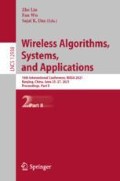Abstract
A content delivery network (CDN) refers to a geographically distributed network of web servers, aiming to enhance the website performance and reliability, i.e., providing fast delivery of the Internet content. CDN is often part of a mature enterprise level network, but due to the distributed nature, CDN may be vulnerable to a distributed denial-of-service attack (DDoS), in which the cyber-attackers try to flood the victim with overloaded traffic or requests. In the literature, the impact of DDoS on CDN has not been widely studied. Motivated by this challenge, in this work, we emulate a CDN environment and investigate the effect of a particular DDoS attack on the environment. It is found that free CDN clusters could be destroyed by only several Gigabyte traffic. In the end, we also discuss some potential solutions to help defend against DDoS attacks.
Access this chapter
Tax calculation will be finalised at checkout
Purchases are for personal use only
Notes
- 1.
More details about the hacking tool test can check our demo at https://www.youtube.com/watch?v=cRXGIWcHX0g&feature=youtu.be.
References
PHPStudy. https://www.xp.cn/
Content Delivery Network Market. https://www.marketsandmarkets.com/Market-Reports/content-delivery-networks-cdn-market-657.html. Accessed Feb 2021
How does CDN work? https://www.cdnetworks.com/web-performance-blog/how-content-delivery-networks-work/. Accessed Feb 2021
What is a CDN? | How do CDNs work? https://www.cloudflare.com/learning/cdn/what-is-a-cdn/. Accessed Mar 2021
Police are now targeting former WebStresser DDoS-for-hire users. https://www.zdnet.com/article/police-are-now-targeting-former-webstresser-ddos-for-hire-users/. Asscessed Mar 2021
Bannour, F., Souihi, S., Mellouk, A.: Adaptive distributed SDN controllers: application to content-centric delivery networks. Future Gener. Comput. Syst. 113, 78–93 (2020)
Cui, S., Asghar, M.R., Russello, G.: Multi-CDN: towards privacy in content delivery networks. IEEE Trans. Dependable Secur. Comput. 17(5), 984–999 (2020)
Hao, S., Zhang, Y., Wang, H., Stavrou, A.: End-users get maneuvered: empirical analysis of redirection hijacking in content delivery networks. In: USENIX Security Symposium, pp. 1129–1145 (2018)
Hassine, N.B., Minet, P., Marinca, D., Barth, D.: Popularity prediction-based caching in content delivery networks. Ann. des Telecommun. 74(5–6), 351–364 (2019)
Hu, X., et al.: STYX: a hierarchical key management system for elastic content delivery networks on public clouds. IEEE Trans. Dependable Secur. Comput. 18(2), 843–857 (2021)
Meng, Y., Kwok, L.F: Enhancing list-based packet filter using IP verification mechanism against IP spoofing attack in network intrusion detection. In: Proceedings of the 6th International Conference on Network and System Security (NSS), pp. 1–14 (2012)
Meng, Y., Kwok, L.F.: Adaptive non-critical alarm reduction using hash-based contextual signatures in intrusion detection. Comput. Commun. 38, 50–59 (2014)
Meng, W., Li, W., Kwok, L.F.: Towards effective trust-based packet filtering in collaborative network environments. IEEE Trans. Netw. Serv. Manage. 14(1), 233–245 (2017)
Meng, W.: Intrusion detection in the era of IoT: building trust via traffic filtering and sampling. IEEE Comput. 51(7), 36–43 (2018)
Nishiyama, H., Fomo, D., Fadlullah, Z.M., Kato, N.: Traffic pattern-based content leakage detection for trusted content delivery networks. IEEE Trans. Parallel Distrib. Syst. 25(2), 301–309 (2014)
Nishimuta, H., Nobayashi, D., Ikenaga, T.: Adaptive server and path switching for content delivery networks. IEICE Trans. Inf. Syst. 103-D(11), 2389–2393 (2020)
Thomdapu, S.T., Katiyar, P., Rajawat, K.: Dynamic cache management in content delivery networks. Comput. Networks 187, 107822 (2021)
B. Zolfaghari, et al.: Rai: content delivery networks: state of the art, trends, and future roadmap. ACM Comput. Surv. 53(2), 34:1–34:34 (2020)
Author information
Authors and Affiliations
Corresponding author
Editor information
Editors and Affiliations
Rights and permissions
Copyright information
© 2021 Springer Nature Switzerland AG
About this paper
Cite this paper
Li, Z., Meng, W. (2021). Mind the Amplification: Cracking Content Delivery Networks via DDoS Attacks. In: Liu, Z., Wu, F., Das, S.K. (eds) Wireless Algorithms, Systems, and Applications. WASA 2021. Lecture Notes in Computer Science(), vol 12938. Springer, Cham. https://doi.org/10.1007/978-3-030-86130-8_15
Download citation
DOI: https://doi.org/10.1007/978-3-030-86130-8_15
Published:
Publisher Name: Springer, Cham
Print ISBN: 978-3-030-86129-2
Online ISBN: 978-3-030-86130-8
eBook Packages: Computer ScienceComputer Science (R0)

